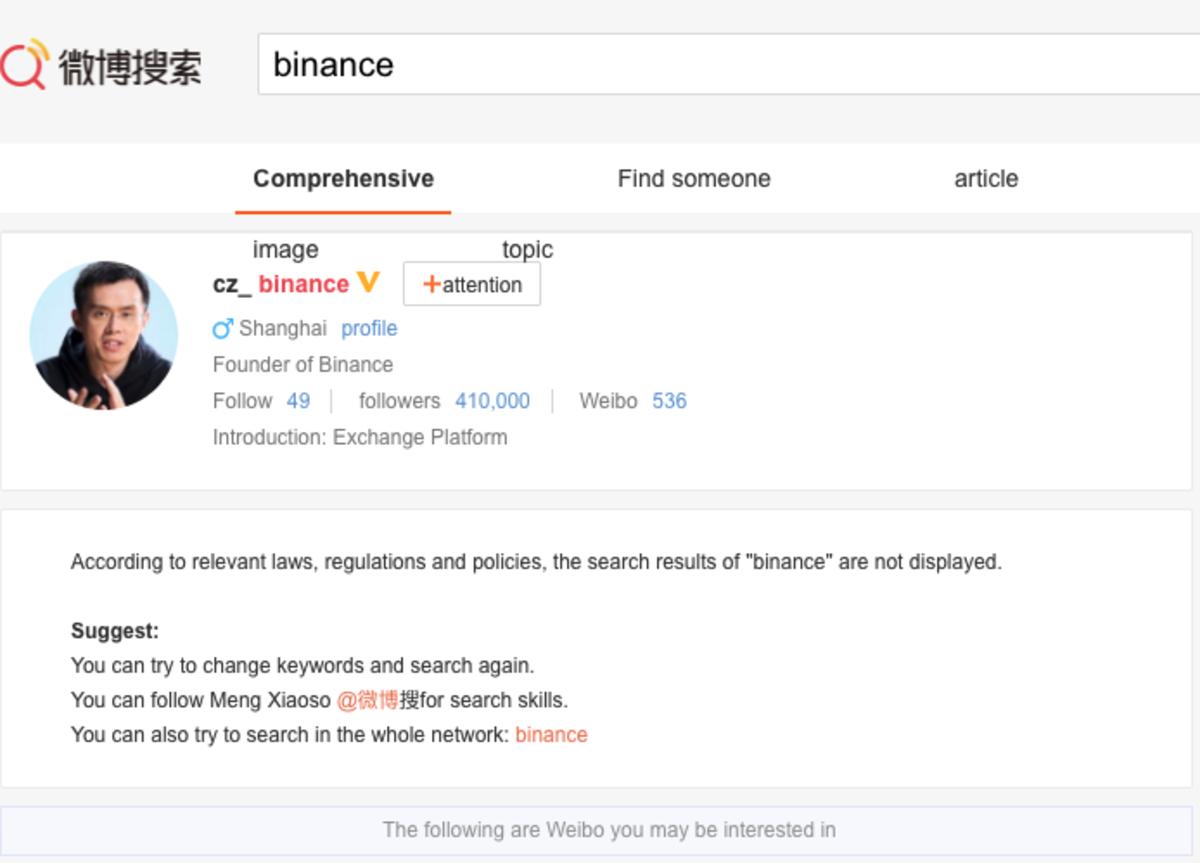Major internet service companies in China, including Baidu and Weibo, are censoring keywords related to bitcoin exchanges, as verified by Bitcoin Magazine.
At the time of writing, Google-like Baidu and Twitter-like Weibo are both omitting search results, effectively censoring specific bitcoin exchange-related keywords. Although personal profiles of Chinese cryptocurrency opinion leaders, like Binance founder Changpeng Zhao, are still available on Weibo, both services show zero search results when searching for bitcoin exchanges Binance, OKEx and Huobi.
The censorship follows a statement from China's State Council that said the government would "crack down on bitcoin mining and trading behavior and resolutely prevent the transfer of individual risks to the society."
On Weibo, for instance, searching for Binance wields a message that reads, "according to relevant laws, regulations and policies, the search results of 'binance' are not displayed." And when searching for OKEx on Baidu, the website returns that "Baidu found 0 related results for you. Sorry, no pages related to 'okex' were found."

Searching for “binance” on Weibo yields the company founder’s profile, but search results are not displayed. Source: Weibo screenshot.
As verified by Bitcoin Magazine, the pattern is repeated when searching for Binance, OKEx and Huobi on both platforms.
Bitcoin Miners Ordered Going Offline
China's State Council statement demanding a crackdown on bitcoin mining and trading last month is also posing a threat to some of the largest bitcoin mining facilities in the country and world.
According to a report by The Block, one of the major economic and technological development zones in the Xinjiang province in China has received a notice demanding that the area shut down all bitcoin mining operations immediately.
"The Reform and Development Commission in the Changji Hui Autonomous Prefecture in Xinjiang issued a notice on Wednesday to its subordinate government officials in the Zhundong Economic Technological Development Park," per the report. "According to the notice … officials in the development park have been instructed to shut down all crypto mining activities under their administration by 2:00 pm China time on Wednesday."
The park houses some of China's biggest bitcoin mining facilities, all powered by fossil fuel energy. It is also home to various coal production industries, including industrial factories and coal-based power plants.
The instruction follows recent comments by bitcoin mining rig manufacturer Canaan that argued against China's regulatory crackdown on the industry. Representatives of the company argued that the sector diminishes energy waste, helps create jobs and nourishes the local economy –– apparently to no avail.
How Will Bitcoin Respond
Though it is hard to determine how much of Bitcoin's hash rate is currently fed by Changji Prefecture's fossil fuel power plants, the Zhundong park has undeniably become a bitcoin mining hub.
Therefore, a shutdown of all bitcoin mining operations in the park might take a toll on the Bitcoin network hash rate. Currently at around 155 exahashes per second, per Glassnode data, the network's hash rate has been relatively stable over the past couple of weeks, increasing by nearly 50% in one year.
The precise impact on the Bitcoin hash rate is hard to predict. However, the network's hash rate may experience a short-term decline as miners are forced to relocate their operations away from Xinjiang. In addition, China's recent regulatory crackdown on bitcoin mining and related financial institutions may incentivize miners to leave the country altogether –– a trend that had already started to brew.
Finally, although the Bitcoin hash rate may suffer in the short term, it is set to recover in the medium to long terms as miners relocate. Furthermore, a reduction of hash rate does not negatively impact the network's security, as explained in a video by Coin Metrics’ Nic Carter, in which he commented on China's mining bans. Carter also highlighted that by forcing bitcoin mining out of China, Bitcoin's carbon emissions would be reduced as miners relocate to greener power plants abroad.











